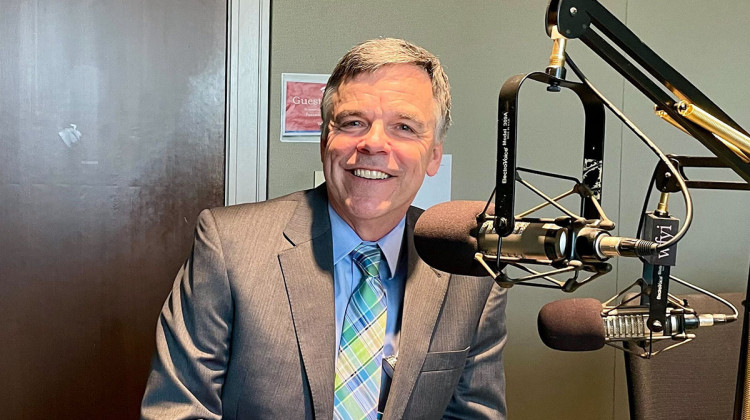
Dr. Christopher Callahan is the chief research and development officer at Eskenazi Health, which is leading a campaign to address health inequities in Indianapolis.
Darian Benson/WFYI NewsHow long a person lives in Indianapolis depends largely on where they live. The gap in life expectancy between different zip codes in the Indianapolis metro area is nearly 17 years. Eskenazi Health recently announced a $60-million campaign to improve life expectancy and health equity for Indianapolis residents.
To learn more about the Beyond Barriers campaign, WFYI’s Darian Benson spoke with Dr. Christopher Callahan, chief research and development officer of Eskenazi Health.
Which parts of Indianapolis will Eskenazi Health be working in?
The initiative is a system-wide approach to addressing social determinants of health, which include factors that influence a person’s health like transportation, access to food or where a person lives.
“We're building the infrastructure to be able to partner with neighborhood organizations, neighbors themselves, and then other partners who want to work on improving the social determinants,” Callahan said.
Eskenazi Health has identified three health equity zones to focus on: the West Side, the East Side and the Far East Side of Indianapolis. Callahan said these areas were chosen because Eskenazi Health already has primary care facilities in these neighborhoods, which have been identified as areas with high needs.
“But then we also have to remember that each of these neighborhoods has strengths,” Callahan said. “And so we were looking for partners and neighborhood organizations who could work with us, because much of this work is not going to be done inside the walls of Eskenazi Health, but we're sort of a Grand Central Station to help patients and their families connect with strengths in their community.”
What kinds of services will be provided?
Through this initiative, Eskenazi Health aims to enhance the infrastructure that already exists to address health inequities, and also provide increased support to other community organizations.
“It's very frustrating to providers to see that they're asking someone, for example, to increase their physical activity, but that person doesn't have a safe neighborhood in which to engage in physical activity or doesn't have a sidewalk or maybe literally doesn't have the time because they're working two jobs,” Callahan said. “So part of what we're serving as is that interface between the social care and the medical care.”
The campaign will build on other efforts Eskenazi Health is working on, Callahan said. Last year, Eskenazi Health announced a new health center on the corner of 38th Street and Arlington Avenue that will also offer social services like workforce development.
The campaign will last five years, but Callahan acknowledged that it will take decades of work to address social determinants of health.
Eskenazi will use community weavers to connect with the health equity zones
Eskenazi will employ people known as community weavers who will help identify what community members need to improve their health and work to find resources or partners to help address those needs.
This position has some overlap with community health workers, who are typically part of the health care system and help with care coordination or work one-one-one with patients to manage a health condition. But the role is distinct, Callahan said.
“That community weaver, in contrast, knows the community and they know the strengths and resources in the community,” Callahan said. “And what we've tried to do is recruit and train these community weavers from the community that they are going to be serving. So they are going to know what's in that community firsthand.”
Contact WFYI health reporter Darian Benson at dbenson@wfyi.org. Follow on Twitter: @helloimdarian.
 DONATE
DONATE






 Support WFYI. We can't do it without you.
Support WFYI. We can't do it without you.